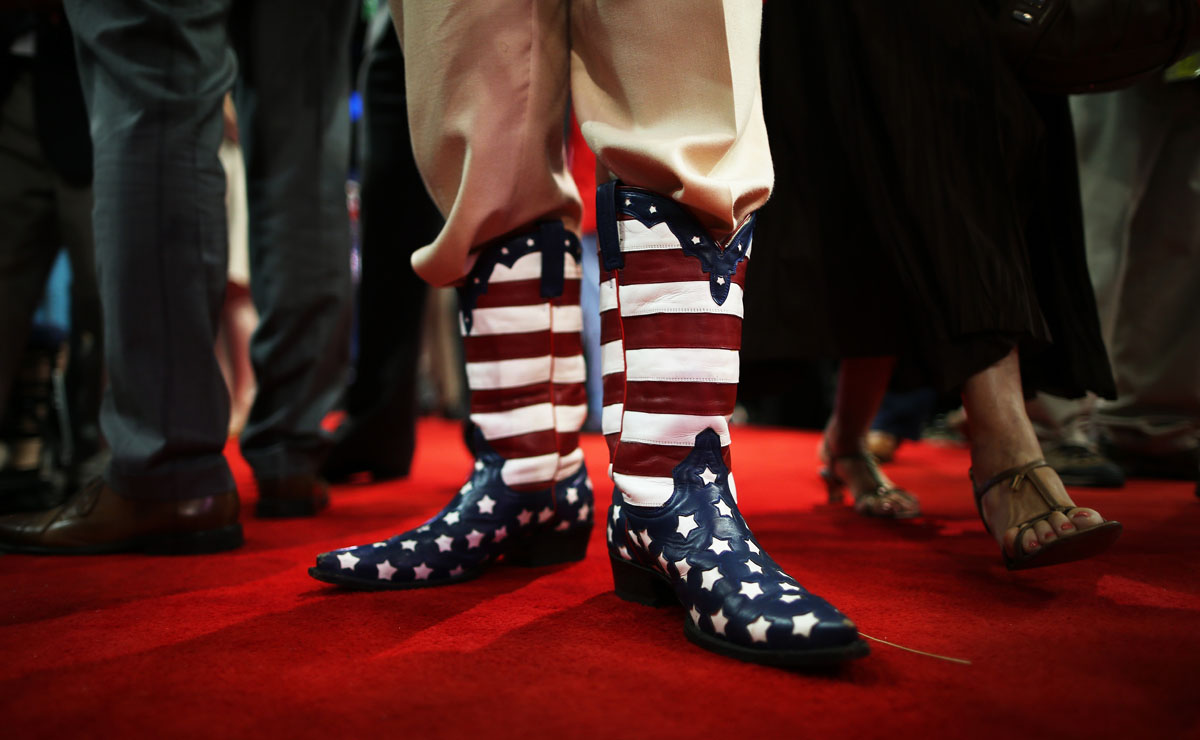Rebranding conservatism
LISTEN TO PODCAST NOW
Podcast: Play in new window | Download (Duration: 1:23:50 — 76.7MB)
Subscribe or Follow Us: Apple Podcasts | Google Podcasts | Spotify | Amazon Music | Android | iHeartRadio | Stitcher | Blubrry | TuneIn | Deezer | RSS

In a land once ruled by a strong conservative Republican base, the increasing splintering amongst conservative Americans has many wondering how far off another run in the White House might be. This week, Leith Marshall and Ben Rylan are joined by Dr Kumuda Simpson from the University of Melbourne.
Author note: I originally wrote this article whilst in New York City back in 2012, in the midst of the US election and a superstorm-ravaged Manhattan. With entire neighbourhoods literally washed away before my eyes, the political fallout following Governor Chris Christie’s embrace of President Obama was a mere hint at just how deep the Republican Party’s divisive problems may be. (Updated March 2014)
NEW YORK CITY, USA – The 2016 US election is still some time away. But this is America, it’s never too early to start work on presenting yourself as a solid presidential option. And while Hillary Clinton quietly waits to make the inevitable official, the Grand Old Party just seems, well, old.
After the shattering defeat suffered by Mitt Romney in 2012, there was little doubt amongst the long red state faces that the next Republican challenger would need to be leading a fresh new party into election mode. Yet when New Jersey was devastated by Superstorm Sandy, and Governor Chris Christie threw politics aside to embrace and praise the assistance offered by President Obama, the Republican attack dogs were quick to break loose.
While news images of the Republican Governor and Democratic President working together certainly helped approval ratings on both sides, the GOP’s knee-jerk critique was a terrible misfire. Everything that happens in the world affects politics, but publicly politicising human suffering only serves to lose the respect of voters.
And yet, in another move that frustrated many on both sides of the political firewall, the Republicans somehow arrived at a decision to stand firm in their opposition to President Obama’s healthcare law, eventually causing the government to shut down and federal funds to dry-up. While sticking to your guns is supremely admirable, there came a point where all political goals were lost amongst the symbolism. And the GOP missed it. The only thing won by the party was blame, and they limped away in tatters.
Looking ahead to 2016, who can offer the party the unity, strength, and most importantly, clear vision it desperately needs if it’s to cut through the hype offered by Hillary Clinton? That’s a super PAC-sized question.
Morning Joe co-host Joe Scarborough has already hosed down rumours of a run. And while Chris Christie licks his wounds in the continuing fallout from that bridge scandal, the memories of being the nation’s most popular Republican must feel a million lightyears away.
The world has changed since the last time a Republican president won the White House. The votes for fears over national security in 2004 have switched to economic anxieties. And social equality plays a much bigger role than it ever did, further complicating any conservative Republican’s message on the national stage.
If the Republican Party is to be a serious contender in 2016, a complete party rebrand is vital.
During the 2012 election, with a left-leaning African-American president in the White House, it was only natural for the Republicans to offer contrast in a true conservative fashion. Mercifully, Michele Bachmann’s campaign dropped off after a number of embarrassing attacks, largely against her staunchly anti-gay stance (one of the most memorable came from a gay robot; “not only are you a homophobe, you’re a robophobe”). Meanwhile, former Vice-Presidential nominee Sarah Palin barely suggested entering the race before returning to her book tour.
A former Massachusetts governor, Mitt Romney fought an unsuccessful battle against John McCain for the 2009 Republican nomination. His 2012 bid largely benefitted from the absence of both McCain and fellow former nominee and close rival Mike Huckabee, who has since emerged as a possible candidate in 2016.
War is still splashed across the headlines, the financial crisis is still rippling, broader economical issues are playing on every American’s mind; both sides have plenty to scream about. However, one particular issue seems to be playing a much bigger role than ever before; social equality.
On that topic, Romney lowered himself into a tank of warring sharks. During his campaign for governor of Massachusetts in 1994, LGBT voters were treated to promises of “full equality”, presumably in response to his more liberal rival Ted Kennedy. But when the Massachusetts high court allowed equal marriage, Romney (unsuccessfully) exercised every bit of his power to strike it down, proclaiming “We don’t want Massachusetts to become the Las Vegas of gay marriage.”
Some observed that there appeared to be two Romneys – the liberal, friendly centre-right community man who proudly helmed Massachusetts, and the steadfastly conservative iron-fisted millionaire we saw auditioning on the national stage in 2012. Romney was quick to remind Republican supporters that he has always been opposed to gay marriage and in favour of legislation banning federal recognition of state-allowed gay marriage, as well as an amendment to the constitution. Despite this, Romney maintains that he does support gay rights, telling New Hampshire voters “I’m in favour of traditional marriage. I oppose same-sex marriage. At the same time, I don’t believe in discriminating in employment or opportunity for gay individuals. So I favour gay rights; I do not favour same-sex marriage. That has been my position all along.”
Former nominee Rick Santorum (who was tipped as potentially playing a role in a Romney administration) is widely considered one of the most vehemently anti-gay politicians in America. Responding to questions in New Hampshire, Santorum aligned gay marriage with polygamy and said marriage in general was not a right, but a “privilege” bestowed by the government; “It’s not discrimination not to grant privileges”.
A very distant rival for Romney in 2009, Ron Paul stuck to his campaign longer than most predicted. Considered less right-wing than some of his louder Republican rivals, he strongly opposed extending any federal rights to same-sex couples and supported the military’s “don’t ask, don’t tell” policy. He claimed to be neutral on civil unions and gay marriage however, providing it’s left for the states to decide.
But autonomy for the states isn’t always a get out of jail free card. The recent close-call on the passing of a bill in Arizona that would have allowed businesses to discriminate against their own customers attracted enough negative press to take some sheltered Arizonians by surprise. For many extreme conservatives, it was the first time social equality issues held enough weight to translate into something even they care about – economics. Meanwhile, the next face of the Iowa Republicans is likely to be Danny Carroll, a former pumpkin farmer who left his job to focus on fighting equal marriage full-time. And he’ll likely be a national figure for the party in the lead-up to 2016.
Healthcare, unemployment, and the economy remain key concerns among American voters. These are core issues that affect just about everyone. Until the GOP loses the old divisive brand of politics still practiced by a damaging few, the White House may remain out of reach for some time.
http://www.youtube.com/watch?v=L6OWvSR9QkA
Podcast: Play in new window | Download (Duration: 1:23:50 — 76.7MB)
Subscribe or Follow Us: Apple Podcasts | Google Podcasts | Spotify | Amazon Music | Android | iHeartRadio | Stitcher | Blubrry | TuneIn | Deezer | RSS
RECENT PODCAST

Saturday 13th, April, 2024: Damien Patterson, Policy and Advocacy Officer, Council to Homeless Persons
Janet Jukes and Macca talk to Damien Patterson, Policy and Advocacy Officer, Council to Homeless Persons Council to Homeless Persons (CHP) ...
LISTEN TO PODCAST NOW
Podcast: Play in new window | Download (Duration: 11:41 — 13.4MB)
Subscribe or Follow Us: Apple Podcasts | Google Podcasts | Spotify | Amazon Music | Android | iHeartRadio | Stitcher | Blubrry | TuneIn | Deezer | RSS

Saturday 13th, April, 2024: Dr Louise Richardson-Self, Senior Lecturer Philosophy & Gender Studies, School of Humanities, Uni of Tas; ‘Gender is not a Threat’
Macca and Janet talk to Dr Louise Richardson-Self, Senior Lecturer Philosophy & Gender Studies, School of Humanities, Uni of Tas; ...
LISTEN TO PODCAST NOW
Podcast: Play in new window | Download (Duration: 11:43 — 13.4MB)
Subscribe or Follow Us: Apple Podcasts | Google Podcasts | Spotify | Amazon Music | Android | iHeartRadio | Stitcher | Blubrry | TuneIn | Deezer | RSS

Saturday 13th, April, 2024: Zoe Daniels, Independent member for Goldsteind, Federal Parliament Update.
Janet and Macca are joined live on air, Zoe Daniels, Independent member for Goldstein; as they discuss, Violence against women, ...
LISTEN TO PODCAST NOW
Podcast: Play in new window | Download (Duration: 25:02 — 28.7MB)
Subscribe or Follow Us: Apple Podcasts | Google Podcasts | Spotify | Amazon Music | Android | iHeartRadio | Stitcher | Blubrry | TuneIn | Deezer | RSS




